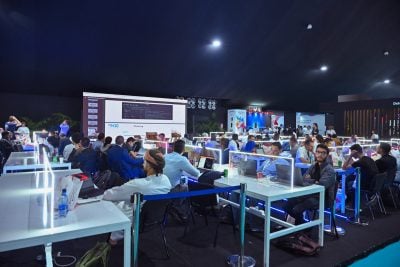Cape Town University launches Africa’s first centre to bridge the gap between basic and clinical health studies and in the process lead to the production of new drugs to combat serious diseases affecting Africans.
Kelly Chibale, a professor of organic chemistry at the University of Cape Town (UCT), says, “South Africa has a strong reputation in the basic science and clinical studies of various diseases – but it has battled to translate this reputation into new medicines. In fact,” he adds, “Africa as a whole lacks the modern skills in drug discovery that will allow the continent to address the increasing economic impact of its most prevalent diseases.”
H3-D, a new research and development project at the university earlier this year, will answer these shortcomings in significant measure. The H3-D – Holistic Drug, Discovery and Development Centre – is dedicated to integrating a number of scientific disciplines: biology, pharmacology, medicinal chemistry, synthetic chemistry, computational chemistry, as well as drug metabolism and pharmaco-kinetic studies.
These skills are directed at designing molecules that contribute to the creation and delivery of new drugs, creating a value chain and a skilled base of expertise and modern technology platforms to assist researchers in tackling the disease burden not only of Africa, but also other parts of the world.
The centre is described as a “holistic research centre that is the first of its kind in sub-Saharan Africa. Its purpose is to bridge the gap between basic sciences and drug development”.
“In doing so,” says Chibale, “H3-D will compete with similar initiatives in Western and Asian countries – in many cases offering the same services and skills at a lower cost because of the exchange rate.”
Strong drivers contributed to the establishment of H3-D. The local government adopted the National Biotechnology Strategy in 2001 and the National Research and Development Strategy in 2002. The latter identified the creation of viable biopharmaceutical industries as priorities to help fight diseases prevalent in South Africa.
“The Centre will enable Africans to find their own solutions to their own health problems,” says Chibale.
The aim is to achieve a “critical mass of personnel” to help make Africa competitive enough to attract contracts from the pharmaceutical industry and research organisations, and create jobs in Africa. Research will focus on drugs for the treatment of malaria, tuberculosis and cardio-vascular diseases.
Stemming the skills-loss flow
Chibale laments that people skilled in the discipline look overseas for a living because of limited job opportunities in pharmaceutical research and development in Africa.
“So it makes sense, in terms of economic and social development, capacity building and knowledge transfer, and medical need, to build a holistic centre to support and accelerate pharmaceutical research in South Africa,” proposes Chibale.
“Our centre offers research infrastructure comparable in quality to that of overseas institutions. With appropriate investment, it can play a significant role in creating jobs and stemming the brain drain of highly skilled Africans in the pharmaceutical field, while attracting expertise from other parts of the world.”
The South African Research Chairs Initiative (SARChI) – created by the Department of Science and Technology and administered through the National Research Foundation – was initiated to make South Africa competitive in the international knowledge economy.
As the founder of H3-D, Chibale holds the new SARChI chair in drug discovery, established to concentrate on the discovery and pre-clinical development of novel potential treatments for major communicable diseases in South Africa; the building of capacity and competency in the relevant areas of drug discovery; and the provision of leadership in medicinal chemistry.
The academic community worldwide has contributed to the founding of H3-D. In addition to UCT, other universities are producing research and graduates able to contribute to South Africa’s budding industry.
Stellenbosch University, Cambridge, other academic institutions and NGOs will work closely with the centre.
Private industry is another driver. Pharmaceutical firms Pfizer of the US and Switzerland’s Novartis became involved at the early stages of planning H3-D, as did NGOs such as Medicines for Malaria Venture (MMV) and the South African government-funded Technology Innovation Agency (TIA), in part to ensure that the facilities would meet high international standards. The discovery of drugs takes time and money.
An expensive courtship
Such research can be an expensive courtship. “The cost of producing one drug can be as high as a billion dollars – and it takes a pharmaceutical company an average of 12 to 14 years from inception to successfully reach the market,” says Chibale.
“Typically, a vast number of molecules are studied before one successful drug is identified; in the clinical phase a success rate of just one in 5,000 is not surprising.”
The challenge is to shorten the time it takes to identify a preclinical drug candidate, to speed up its development and eventual marketing. That is the challenge H3-D is taking on.
Mamphela Ramphele, chairperson of South Africa’s Technology Innovation Agency, says researchers should seize this opportunity also to tackle diseases such as typhoid, cholera and river blindness, conditions largely confined to Africa.
Chibale cautions against the anticipation of quick breakthroughs, saying it could be some time before drugs start rolling out.
“I don’t want to create unrealistic expectations. We will kiss many frogs before meeting the prince.”
Want to continue reading? Subscribe today.
You've read all your free articles for this month! Subscribe now to enjoy full access to our content.
Digital Monthly
£8.00 / month
Receive full unlimited access to our articles, opinions, podcasts and more.
Digital Yearly
£70.00 / year
Our best value offer - save £26 and gain access to all of our digital content for an entire year!

 Sign in with Google
Sign in with Google 





